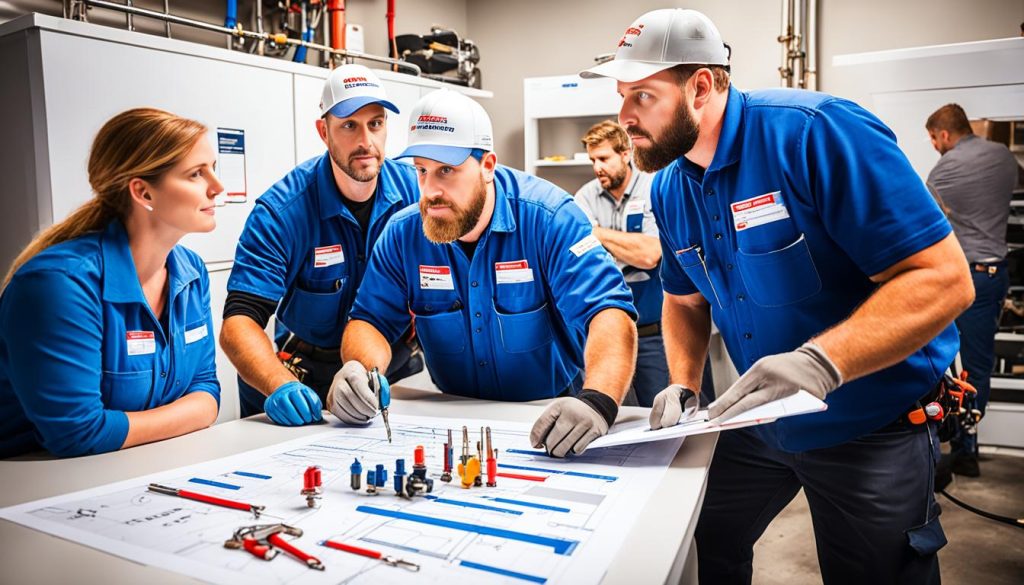Starting a Plumbing Business Without Plumbing Expertise
Did you know that you can start a plumbing business without being a plumber? It’s true! Many aspiring entrepreneurs are unaware that a background in plumbing is not a prerequisite for owning a successful plumbing company. Instead, the key to success lies in running a well-managed business and partnering with or hiring expert plumbers to handle the technical aspects of the trade.
Whether you have a passion for entrepreneurship or simply see the potential in the plumbing industry, starting a plumbing business without plumbing experience is an achievable goal with the right guidance and support. Companies like bluefrog Plumbing + Drain offer coaching and support for hiring qualified plumbers, training programs, and ongoing support for franchisees, making it easier than ever to embark on this entrepreneurial journey.
Key Takeaways:
- Starting a plumbing business without being a plumber is possible by partnering with or hiring expert plumbers.
- Companies like bluefrog Plumbing + Drain offer coaching and support for aspiring plumbing business owners.
- Owning a plumbing business is primarily about running a successful business rather than having plumbing expertise.
- By following the right steps and obtaining the necessary training and qualifications, you can establish credibility and attract customers.
- Effective marketing strategies are vital to promoting your plumbing business and attracting a steady stream of customers.
The Benefits of Owning a Plumbing Business
Owning a plumbing business offers several benefits, even if you don’t have plumbing expertise. Plumbing is an essential service, which means there is a high demand for plumbers. With the right marketing and customer service strategies, a plumbing business can be highly profitable. Additionally, owning a plumbing business allows you to be your own boss and set your own schedule. It provides an opportunity for personal and professional growth, as you develop business management skills and build a successful enterprise. While technical plumbing knowledge is valuable, partnering with or hiring expert plumbers can bridge the gap and allow you to focus on running and growing your business.
One of the main advantages of owning a plumbing business as a non-plumber is the high demand for plumbing services. Plumbing is an essential service in every community, and there will always be a need for skilled professionals to solve plumbing problems. This demand ensures a steady stream of customers and potential for growth.
Another benefit of owning a plumbing business is the opportunity to be your own boss. As a business owner, you have the freedom to make decisions and set your own schedule. You can create a work-life balance that suits your needs and priorities.
Furthermore, owning a plumbing business allows you to develop valuable business management skills. While you may not have the technical expertise of a plumber, you can focus on the overall operation and growth of your business. By implementing effective marketing strategies, managing finances, and providing excellent customer service, you can build a successful plumbing business.
Partnering with or hiring expert plumbers is a crucial aspect of owning a plumbing business without plumbing skills. By having experienced plumbers on your team, you can ensure that high-quality work is delivered to your clients. This collaboration allows you to leverage their technical knowledge and focus on managing and expanding your business.
To summarize, although plumbing knowledge is valuable, it is possible to start a successful plumbing business without plumbing expertise. The benefits of owning a plumbing business include a high demand for services, the ability to be your own boss, personal and professional growth, and the opportunity to partner with expert plumbers. By utilizing these advantages, non-plumbers can enter the plumbing industry and thrive as business owners.
Steps to Launching a Plumbing Business Without Plumbing Experience
Launching a plumbing business without plumbing experience requires careful planning and execution. Here are the steps to get started:
- Set clear goals and objectives for your business.
- Register your business and decide on the legal structure.
- Create a comprehensive business plan that includes financial projections, growth opportunities, marketing strategies, and short and long-term goals.
- Consider obtaining relevant training and qualifications to gain credibility and offer a wider range of services.
- Secure financing for your business through small business loans or government loan schemes.
- Invest in a reliable vehicle and quality plumbing tools and equipment.
- Develop a marketing strategy to promote your business and attract customers.
- Seek advice and learn from others in the industry to gain insights and best practices.
By following these steps, you can successfully launch and grow a plumbing business without prior plumbing experience.
Training and Qualifications for Non-Plumbers in the Plumbing Business
As a non-plumber starting a plumbing business, it is important to gain relevant training and qualifications to establish credibility and offer a wide range of services. While a background in plumbing is not necessary, obtaining certifications and qualifications can enhance your business’s reputation and attract more customers.
There are various training programs and courses available for non-plumbers to learn the basics and practical aspects of plumbing. These programs allow you to acquire the necessary skills and knowledge to confidently handle plumbing tasks and provide excellent service to your customers.
Additionally, staying updated with the licensing requirements and regulations specific to your region is crucial. This ensures that you operate within the legal framework and comply with industry standards, further bolstering your credibility as a professional plumbing service provider.
Investing in training and qualifications not only enhances your expertise but also builds trust with your customers. They will feel confident knowing that you have the necessary knowledge and skills to tackle their plumbing needs effectively and efficiently.
By offering quality services and demonstrating your commitment to ongoing professional development, you can establish yourself as a reliable and reputable plumbing business in the industry.
Qualifications and Certifications for Plumbers
Obtaining relevant qualifications and certifications is an important step in building your credibility as a non-plumber in the plumbing industry. Here are some common qualifications and certifications that you can pursue:
| Qualification/Certification | Description |
|---|---|
| Journeyman Plumbers Certification | Recognizes individuals who have completed an apprenticeship program and possess the necessary skills and knowledge in plumbing. |
| Master Plumbers License | This license demonstrates advanced knowledge and expertise in plumbing. It allows you to undertake more complex plumbing projects and often requires several years of experience. |
| Backflow Prevention Certification | This certification enables you to install, repair, and test backflow prevention devices. It is often required by local regulations to ensure the safety of drinking water systems. |
| GreenPlumbers Certification | GreenPlumbers is a certification program that focuses on sustainable plumbing practices and technologies. It equips you with the knowledge to offer environmentally-friendly plumbing solutions. |
| Plumbing Code Certification | This certification demonstrates your understanding of local plumbing codes and regulations. It ensures that your work complies with safety standards and legal requirements. |
These qualifications and certifications serve as evidence of your expertise and dedication to providing quality plumbing services. They instill confidence in your customers and set you apart from competitors in the industry.
Financing and Resources for Starting a Plumbing Business Without Plumbing Experience
Starting a plumbing business without prior plumbing experience requires careful financial planning and access to the right resources. Securing funding and acquiring quality tools and equipment are essential steps to ensure a successful start. Below, I outline the financing options available and the necessary resources needed to establish your plumbing business.
Financing Options
Entrepreneurs without plumbing experience can explore various financing options to cover initial expenses:
- Small Business Loans: Banks and financial institutions offer small business loans specifically designed for startups. These loans can provide the necessary capital to purchase a service vehicle, plumbing tools, and equipment.
- Government Loan Schemes: Many governments provide loan schemes and grants to promote entrepreneurship. Research local government programs and initiatives that support small businesses, as they may provide favorable loan options or grants for plumbing startups.
- Angel Investors: Consider pitching your business idea to angel investors who are interested in supporting promising startups. Angel investors can provide capital and valuable guidance to help your plumbing business get off the ground.
Take the time to research and compare the financing options available to determine which one best suits your needs and financial goals.
Resources
In addition to financing, gathering the necessary resources is crucial for starting a plumbing business without plumbing experience. Here are some key resources to consider:
- Plumbing Tools and Equipment: Invest in reliable and durable plumbing tools and equipment to ensure quality workmanship and customer satisfaction. Research reputable suppliers and choose tools that are essential for various plumbing tasks.
- Knowledge and Education: Although you may not be a trained plumber, it’s important to possess a basic understanding of plumbing principles and industry standards. Consider enrolling in plumbing courses or workshops to gain foundational knowledge and improve your credibility.
- Industry Connections: Establishing relationships with experienced plumbers can be invaluable. Networking with industry professionals can provide access to mentorship, advice, and potential partnerships.
By investing in the right resources, you can ensure your plumbing business is well-equipped to deliver high-quality services and meet customer demands.
Complete the HTML table:
| Financing Options | Resources |
|---|---|
|
|
Marketing Strategies for Non-Plumbers in the Plumbing Industry
Launching a plumbing business without prior plumbing experience requires effective marketing strategies to attract customers and grow your business. Here are some key tactics to consider:
Create a professional website: Design and optimize your website to increase online visibility. Use relevant keywords and local search engine optimization techniques to rank higher in search results.
Utilize social media platforms: Engage with potential customers on platforms like Facebook, Instagram, and LinkedIn. Share informative content, showcase your expertise, and interact with your audience to build relationships.
Develop a strong online presence: List your business in relevant industry directories and review platforms. Encourage satisfied customers to leave positive reviews, which will enhance your reputation and attract more leads.
Build local relationships: Network with other local businesses and contractors to generate referrals. Establish partnerships or cross-promotion arrangements to tap into new customer networks and expand your reach.
Offer promotions and discounts: Provide incentives for new customers to try your plumbing services. This can include first-time customer discounts, referral bonuses, or seasonal promotions to encourage repeat business.
Leverage customer testimonials: Highlight positive feedback from satisfied customers on your website and social media channels. Positive reviews and testimonials build trust and credibility, making potential customers more likely to choose your services.
Implement targeted online advertising campaigns: Utilize pay-per-click advertising or social media advertising to reach your target audience effectively. Craft targeted campaigns based on location, demographics, and specific plumbing needs to maximize your ad spend.
By implementing these marketing strategies, non-plumbers can successfully promote their plumbing businesses, attract new customers, and establish a strong presence in the plumbing industry.
Source Links
- https://bluefrogfranchise.com/you-dont-have-to-be-a-plumber-to-own-a-plumbing-business/
- https://www.plumbingzone.com/threads/should-i-start-plumbing-business.74754/
- https://www.tradifyhq.com/blog/how-to-start-a-plumbing-business
- Investing Wisely: How Windows & Doors in Boost Property Value and Financial Health - April 24, 2025
- The Financial Impact of Personal Injuries: Why Legal Help Matters for Business Owners - April 16, 2025
- The Hidden Financial Costs of Domestic Assault: What Business Owners Need to Know - April 16, 2025













